Treatment Modalities for Addiction
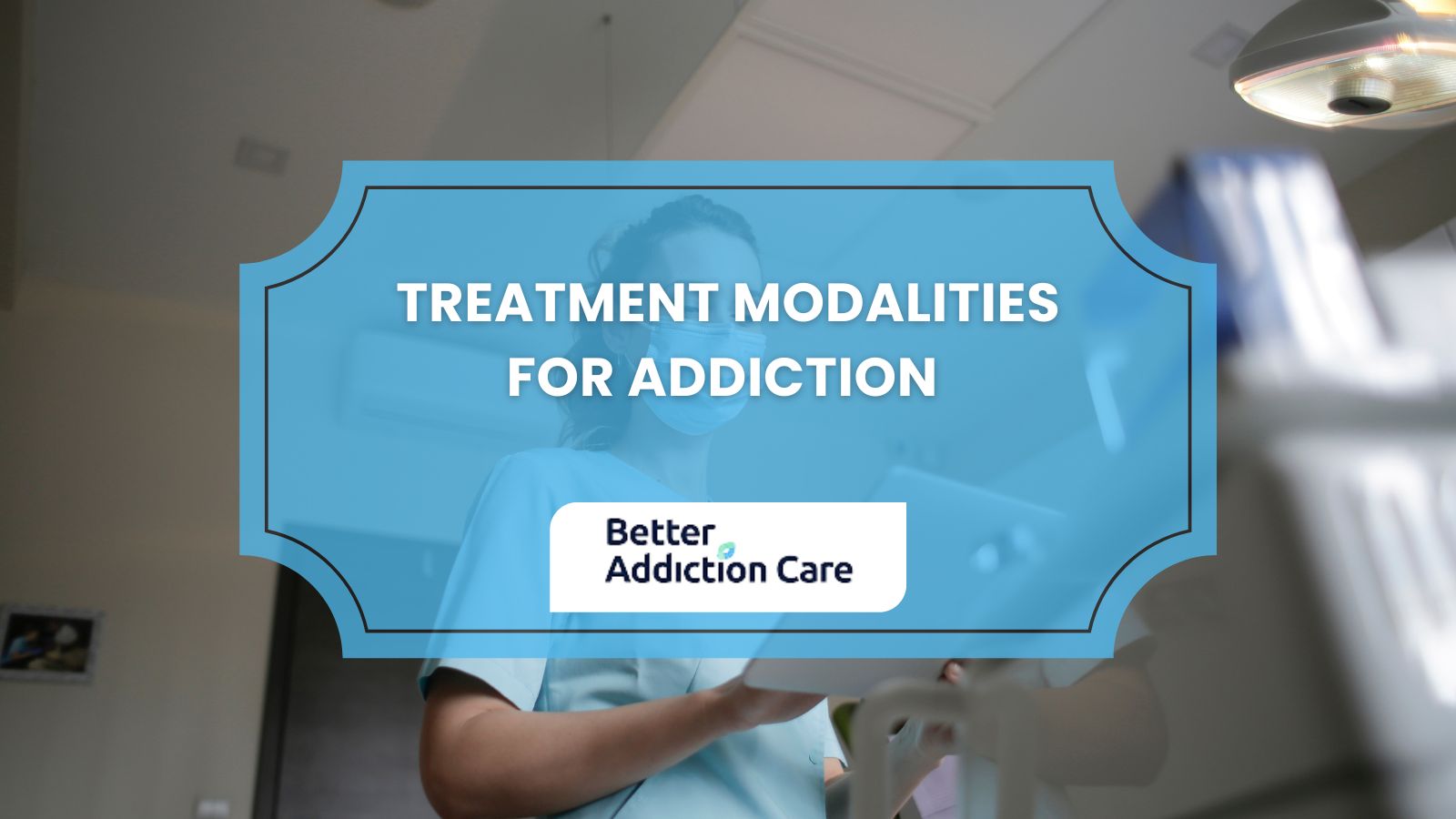
Treatment modalities for addiction are structured therapeutic approaches and intervention methods designed to help individuals overcome substance use disorders or behavioral addictions. These evidence-based practices encompass a range of psychological, pharmacological, and social support strategies that target different aspects of addiction, including physical dependence, psychological cravings, behavioral patterns, and underlying causes of substance misuse. Treatment modalities vary in intensity, duration, and therapeutic focus to accommodate different levels of addiction severity, individual needs, and recovery goals.
According to the 2017 National Survey on Drug Use and Health indicates 10% of Americans meet criteria for substance use disorders, totaling approximately 26.5 million people. The distribution reveals 16.7 million with mild disorders, 5.2 million with moderate disorders, and 4.6 million with severe disorders. Addiction severity and probation status emerge as the strongest predictors of treatment receipt. People with severe opioid use disorder demonstrate the highest treatment receipt rate at 55.6%, while those with mild alcohol use disorder show the lowest at only 1.8%. The researchers recommend optimizing existing specialty addiction services for moderate and severe cases rather than expanding capacity, alongside increasing general healthcare system utilization for mild cases.
What Are The Treatment Modalities For Addiction?
The treatment modalities for addiction includes pharmacotherapy, psychotherapy, behavioral interventions, support groups, holistic approaches, detoxification, inpatient rehabilitation, outpatient programs, recovery housing, telehealth services, motivational enhancement, contingency management, family therapy, cognitive-behavioral therapy, dialectical behavior therapy, acceptance and commitment therapy, mindfulness-based relapse prevention, matrix model, 12-step facilitation, and therapeutic communities.
Here are the key treatment modalities for addiction treatment in detail below:
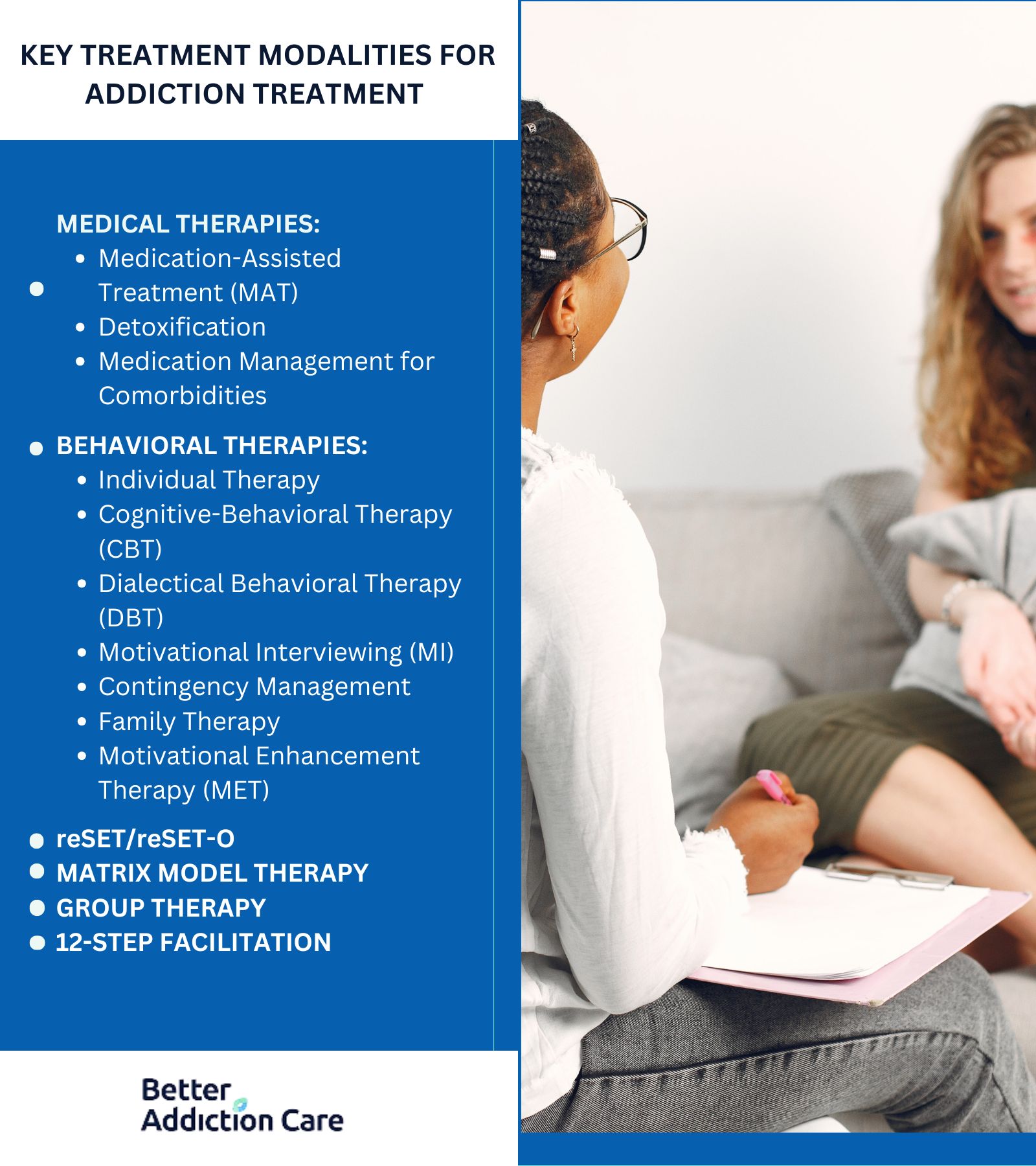
Medical Therapies
Medical therapies are interventions that utilize pharmacological agents, medical devices, or procedures to treat, manage, or prevent health conditions under the direction of healthcare professionals. In addiction treatment, these include Medication-Assisted Treatment (MAT), which combines medications with counseling; medical detoxification for safe withdrawal management; and medication management for ongoing pharmacological assessment and adjustment. These approaches directly target the physiological mechanisms of addiction through evidence-based medical protocols.
Here are the common medical therapies:
Medication-Assisted Treatment
Medication-Assisted Treatment represents a comprehensive approach to substance use disorders that combines pharmacological interventions with behavioral therapy to address addiction's physiological and psychological components. MAT integrates FDA-approved medications with counseling and behavioral therapies to provide a "whole-patient" approach to treating substance use disorders. Medications such as methadone help normalize brain chemistry, block the euphoric effects of alcohol and opioids, relieve physiological cravings, and normalize body functions without the negative effects of the abused drug. Buprenorphine works by binding to the same receptors as opioids but with less intensity, reducing cravings and withdrawal symptoms while allowing patients to function normally. Naltrexone functions differently by blocking the euphoric and sedative effects of opioids and reducing the rewarding effects of alcohol consumption. These pharmacological interventions, when combined with psychosocial support, significantly improve treatment outcomes by addressing both the biological aspects of addiction and the behavioral patterns that maintain substance use disorders.
According to Spayde-Baker, A.’s 2023 study, ‘A comparison of medication-assisted treatment options for opioid addiction: A review of the literature, ’ medication-assisted treatment (MAT) demonstrates significant efficacy in treating opioid addiction. Buprenorphine maintains 60% of patients opioid-free compared to 20% without treatment. Methadone, the gold standard therapy, achieves opioid-free rates up to 60% with adherence rates of 49.1%. Naltrexone in oral form shows poor adherence below one-third, while its extended-release version (XR-NTX) achieved 100% retention in a small study. Non-adherent patients face 3.5 times higher overdose risk than adherent individuals. The effectiveness varies between medications, with methadone offering the highest retention rates, followed by buprenorphine as the second most effective option for harm reduction and relapse prevention.
Detoxification
Detoxification is the process of clearing harmful substances from the body under medical supervision, often marking the first step in addiction treatment. It focuses on managing withdrawal symptoms and reducing cravings to ensure a safe and stable transition toward recovery. This phase is essential for addressing the physical impact of substance use while preparing individuals for ongoing therapeutic care. For those exploring options, detoxification programs offer structured support and medical oversight to help individuals begin their recovery journey effectively.
According to Timko, C.’s 2016 study, ‘Transitioning From Detoxification to Substance Use Disorder Treatment: Facilitators and Barriers, ’ addiction treatment begins with detoxification, representing one-fifth of all treatment admissions. Detoxification prevents withdrawal complications but lacks effectiveness without transition to comprehensive treatment. Successful transitions reduce relapse, criminal activity, and emergency healthcare usage while improving employment and housing stability. Patient motivation, effective discharge planning, and integrated healthcare systems facilitate transitions, while distance to facilities, personal obligations, stigma, wait times, and poor coordination create barriers.
Medication Management for Comorbidities
Medication management for comorbidities involves addressing co-occurring mental health conditions such as anxiety, bipolar disorder, or depression alongside substance use disorders. Prescribed medications target these conditions to improve overall well-being and support recovery. Alongside medication-assisted treatment (MAT) for addiction, these medications help stabilize mood, reduce symptoms, and enhance the effectiveness of therapeutic interventions.
Behavioral Therapies
Behavioral therapies are evidence-based treatment approaches that focus on changing unhealthy behavior patterns associated with addiction. These include Cognitive-Behavioral Therapy (CBT), Dialectical Behavior Therapy (DBT), Motivational Interviewing (MI), Contingency Management (CM), and more.
Here are the common behavioral therapies:
Individual Therapy
Individual therapy is a cornerstone of addiction treatment, providing a space for confidential exploration of personal experiences, psychological factors contributing to addiction, and strategies for coping. Therapists tailor approaches such as Cognitive-Behavioral Therapy (CBT), Dialectical Behavioral Therapy (DBT), Motivational Interviewing (MI), and psychodynamic techniques to align with the patient’s goals. Through self-reflection, emotional processing, and skill-building, individual psychotherapy fosters healing and personal growth, empowering individuals to address the root causes of their addiction and develop healthier ways of living.
Cognitive-Behavioral Therapy (CBT)
Cognitive-Behavioral Therapy is a structured approach that helps individuals understand and manage the thoughts and behaviors driving their addiction. By focusing on developing healthy coping mechanisms, problem-solving skills, and resilience to triggers, CBT addresses cognitive distortions and the underlying causes of substance use. This therapy equips patients with tools to make lasting behavioral changes, reducing the likelihood of relapse. For more information on how CBT supports recovery, resources highlight its effectiveness in fostering long-term change.
According to Magill, M.’s 2023 study, ‘Efficacy of Cognitive Behavioral Therapy for Alcohol and Other Drug Use Disorders: Is a One-Size-Fits-All Approach Appropriate?.’, Cognitive Behavioral Therapy (CBT) for addiction produces specific measurable outcomes. Project MATCH data show CBT achieved 25% abstinence rates for outpatients and 48% for aftercare patients. An additional 7% of outpatients and 14% of aftercare patients continued use without consequences.
Dialectical Behavioral Therapy (DBT)
Dialectical Behavioral Therapy was originally developed to treat Borderline Personality Disorder but has since been adapted for addiction treatment. DBT emphasizes acceptance, mindfulness, and emotional regulation, helping individuals manage intense emotions, build healthier relationships, and cope with stress without resorting to substances or destructive behaviors. The focus on balancing acceptance and change enables patients to develop practical skills for navigating challenges.
According to Davoudi, M.’s 2021 study, ‘A pilot randomized controlled trial of dialectical behavior therapy (DBT) for reducing craving and achieving cessation in patients with marijuana use disorder: feasibility, acceptability, and appropriateness.’, DBT achieved 46% marijuana cessation at post-test and 40% at two-month follow-up compared to the control group's 16% and 9.5%. DBT maintained 96% participant retention versus 77% in the control group, and relapsed DBT patients consumed marijuana on fewer days. The research confirms DBT's effectiveness, feasibility, and acceptability for marijuana use disorder treatment.
Motivational Interviewing (MI)
Motivational Interviewing is a collaborative, patient-centered approach designed to enhance motivation for change and reduce ambivalence about recovery. Through empathic listening, reflective questioning, and affirmations, MI helps individuals explore their values, set meaningful goals, and recognize discrepancies between their actions and aspirations. This process strengthens internal motivation and supports sustained progress in overcoming addiction.
According to Smedslund, G.’s 2011 study, ‘Motivational interviewing for substance abuse, ’ Motivational Interviewing shows significant effectiveness for substance abuse compared to no treatment, with the strongest effects immediately after treatment (moderate-to-large positive effect of 0.79, with 95% confidence between 0.48-1.09). MI outperformed assessment and feedback at medium follow-up but showed no advantage over treatment as usual or other active interventions.
Contingency Management
Contingency management is an addiction therapy approach that uses rewards to reinforce positive behaviors and discourage drug use. This method focuses on promoting abstinence and improving adherence to treatment plans by providing tangible incentives for progress. By emphasizing immediate reinforcement, contingency management supports short-term abstinence and encourages active participation in the recovery process.
According to Ginley, M.K.’s 2021 study, ‘Long-term efficacy of contingency management treatment based on objective indicators of abstinence from illicit substance use up to 1 year following treatment: A meta-analysis.’, Contingency Management (CM) treatment is 22% more effective at maintaining long-term drug abstinence than other treatments. The research examined 23 randomized trials using objective urine tests, proving CM outperforms standard approaches like cognitive-behavioral therapy for up to one year after treatment ends. Longer CM treatment periods produce better outcomes.
Marriage and Family Therapy
Marriage and family therapy is a therapeutic approach that addresses the impact of substance use disorders on family dynamics and close relationships. This therapy improves communication, problem-solving, trust, and emotional bonds within families, creating a supportive environment for recovery. By involving family members in the healing process, MFT strengthens relational connections and aids in long-term rehabilitation.
According to Esteban, J.’s 2022 study, ‘ Effects of family therapy for substance abuse: A systematic review of recent research.’, Family Therapy demonstrates significant effectiveness in treating substance abuse, with 88.2% of the high-quality studies being randomized controlled trials and 76.5% maintaining follow-up rates between 85-100%. The research consistently shows that incorporating family members in treatment reduces substance consumption and improves family functioning across various approaches, including Multidimensional Family Therapy, Brief Strategic Family Therapy, and Ecologically-Based Family Therapy.
Motivational Enhancement Therapy (MET)
Motivational enhancement therapy is a person-centered intervention designed to inspire change in individuals struggling with substance use and addiction. This rapid approach helps individuals overcome hesitation, ambivalence, and fear of change by fostering internal motivation. Therapists guide patients through empathic listening, introspective questioning, and constructive feedback, empowering them to take meaningful steps toward recovery.
According to Kumar, S.’s 2021 study, ‘Effect of Motivational Enhancement Therapy (MET) on the self-efficacy of Individuals of Alcohol dependence, ’ Motivational Enhancement Therapy (MET) significantly increases self-efficacy in alcohol-dependent individuals. The study found MET plus standard treatment raised self-efficacy scores from 56.3 to 60.8, compared to minimal improvement in the control group (p=0.006). MET effectively reduces ambivalence and supports abstinence alongside medical treatment.
reSET/reSET-O
reSET and reSET-O are FDA-approved digital therapeutics used in the treatment of substance use disorders. These smartphone-based applications deliver evidence-based interventions rooted in cognitive-behavioral therapy, contingency management, and interactive skill-building exercises. reSET supports individuals with substance use disorders, while reSET-O specifically targets opioid use. By combining technology with proven therapeutic techniques, these tools provide accessible and effective support for recovery.
According to Velez, F. F.’s 2022 study, ‘Reduced Healthcare Resource Utilization in Patients with Opioid Use Disorder in the 12 Months After Initiation of a Prescription Digital Therapeutic.’, patients with opioid use disorder using reSET-O prescription digital therapeutic experienced 28% fewer inpatient stays, 56% fewer hospital readmissions, and 7% fewer emergency department visits over 12 months compared to controls. The reSET-O group showed 12% fewer total hospital encounters and demonstrated improved medication adherence with an 8.7% higher medication possession ratio. These improvements resulted in $2,791 lower per-patient costs overall, with Medicaid patients showing $3,832 in cost reductions.
Matrix Model Therapy
Matrix model therapy is a comprehensive addiction treatment program that integrates behavioral therapy, family education, individual counseling, and support groups. This structured approach enhances motivation, teaches coping skills, promotes abstinence, and addresses patterns of substance use. By combining multiple therapeutic components, the matrix model provides a holistic framework for recovery, empowering individuals to achieve and maintain sobriety.
According to Eghbali, H.’s 2013 study, ‘The effectiveness of matrix interventions in improving methadone treatment. International Journal of High Risk Behaviors & Addiction, Matrix Model Therapy with methadone treatment achieves 96.2% abstinence at post-treatment versus 58.3% with methadone alone. At three-month follow-up, 75% of Matrix patients remained abstinent compared to 33.3% in the control group. Matrix patients stayed in treatment longer (195 days versus 132 days) and required lower methadone dosages, confirming the intervention's effectiveness for opioid dependency.
Group Therapy
Group therapy is a form of psychotherapy where small groups meet to discuss, share experiences, and support one another under the guidance of a trained therapist. This approach fosters a sense of community, reduces stigma, and provides individuals with new perspectives on addiction and recovery. Participants engage in discussions about topics such as relapse prevention, communication skills, anger management, and coping with cravings. By creating a supportive environment, group sessions help individuals build connections and develop essential tools for long-term recovery.
According to Wendt, D. C.’s 2017 study, ‘Group Therapy for Substance Use Disorders: A Survey of Clinician Practices, ’ group therapy demonstrates equal effectiveness to individual therapy for substance use disorder treatment. Group therapy appears in over 90% of SUD treatment facilities across the United States, with many centers using it as their primary treatment modality. Research shows this treatment approach creates cost-effectiveness while maintaining clinical outcomes. The predominance of group therapy reflects both its therapeutic value and the influence of mutual support frameworks like Alcoholics Anonymous and the Minnesota Model in addiction treatment history.
12-Step Facilitation Therapy
12-step facilitation therapy is a structured group-based approach designed to treat drug and alcohol addiction by promoting adherence to the principles of the 12-step program. This method encourages individuals to admit their powerlessness over addiction, surrender to a higher power, take responsibility for their actions, make amends for past wrongs, and support others in recovery. Widely used in organizations like Narcotics Anonymous (NA) and Alcoholics Anonymous (AA), this therapy emphasizes personal growth, accountability, and spiritual development as key components of sustained sobriety.
Alternative Therapies
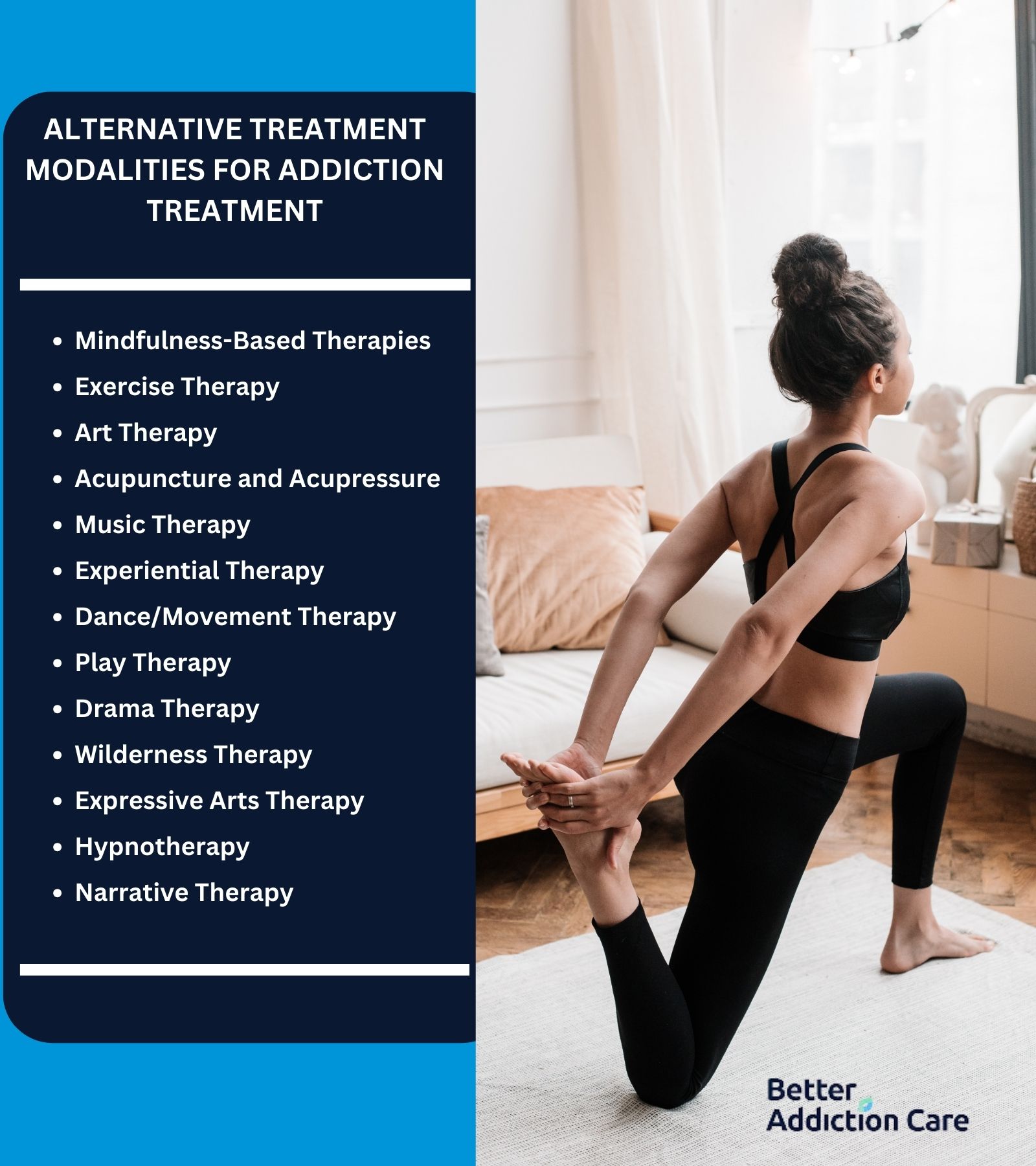
Alternative therapies encompass a range of non-traditional addiction treatment modalities that complement medical and behavioral interventions. These holistic approaches address the physical, emotional, and spiritual aspects of recovery, aiming to enhance overall well-being, reduce suffering, and assist individuals in managing cravings and emotions. By integrating practices such as mindfulness, exercise, and creative expression, non-traditional addiction treatments provide additional pathways to healing and long-term wellness.
Mindfulness-Based Therapies
Mindfulness-based therapies focus on increasing self-awareness and emotional regulation to help individuals manage stress, cravings, and triggers associated with addiction. Practices such as mindfulness meditation, yoga, and Tai Chi promote non-judgmental acceptance of thoughts, emotions, and bodily sensations while improving emotional balance. Emotional Freedom Techniques (EFT), also known as tapping therapy, target meridian points to alleviate emotional pain. Mindfulness supports addiction recovery by fostering positivity and reducing the impact of negative emotions.
According to Vidrine, J. I.’s 2016 study, ‘Efficacy of mindfulness-based addiction treatment (MBAT) for smoking cessation and lapse recovery: A randomized clinical trial.’, Mindfulness-Based Addiction Treatment (MBAT) demonstrated significant effectiveness in helping smokers recover from lapses compared to alternative treatments. While there were no overall significant treatment effects on abstinence rates across the three conditions, MBAT showed marked superiority in promoting recovery after a smoking lapse. Specifically, MBAT was nearly 5 times more effective than Cognitive Behavioral Treatment (OR=4.94) and over 4 times more effective than Usual Care (OR=4.18) in helping participants regain abstinence after a lapse.
Exercise Therapy
Exercise therapy involves incorporating physical activity into addiction treatment to improve mental health and overall well-being. This method utilizes continuous physical activity such as aerobic exercises, strength training, and outdoor activities to boost mood, reduce stress, and enhance physical health. Regular exercise helps individuals manage withdrawal symptoms, regulate emotions, and build resilience during recovery.
According to Piché, F.’s 2024 study, ‘Physical activity during a treatment for substance use disorder: A qualitative study.’, patients perceive exercise as self-care through health improvements, it serves as a relapse prevention mechanism by occupying time and building healthy networks, and it facilitates treatment retention by developing social support. The qualitative study of 13 participants (69% men, mean age 33.4±8.3 years) who completed a 5-week exercise program during residential treatment found that physical activity helped control emotions, build self-esteem, and promote healthier lifestyle habits that reinforce confidence in managing future relapse risks.
Art Therapy
Art therapy is a creative therapeutic approach that uses various art activities to stimulate healing, self-expression, and emotional processing. This method allows individuals to communicate feelings and experiences nonverbally, providing a safe outlet for difficult-to-articulate emotions. Through painting, drawing, or sculpting, individuals in addiction recovery explore their inner world, process trauma, and develop healthier coping mechanisms. Art therapy supports recovery by helping individuals manage their emotions and fostering personal growth.
According to Quinn P.’s 2025 study, ‘Art therapy's engagement of brain networks for enduring recovery from addiction, ’ art therapy effectively treats addiction through neural network activation that counteracts trauma effects. Brain imaging confirms art therapy activates regions involved with reward, stress, and inhibition, which directly correlates with addiction pathways. 38.6% of addiction treatment programs incorporated art therapy despite reimbursement challenges. SAMHSA promotes art therapy integration into addiction treatment for its demonstrated ability to engage clients' abilities, attention, and insightfulness while helping identify and manage difficult emotions.
Acupuncture and Acupressure:
Acupuncture and acupressure are traditional Chinese medicine practices used in addiction therapy to promote healing and balance within the body. These techniques involve stimulating specific acupoints to restore energy flow and accelerate recovery. By targeting physical and emotional imbalances, acupuncture and acupressure help reduce cravings, alleviate withdrawal symptoms, and improve overall well-being.
According to Lee, M. Y.’s 2021 study, ‘Bidirectional role of acupuncture in the treatment of drug addiction, ’ acupuncture effectively treats drug addiction through bidirectional regulation of brain pathways. Acupuncture reduces drug-seeking behavior by directly activating specific brain pathways and normalizing mesolimbic dopamine system dysfunctions. It regulates neurotransmitters involved in drug craving modulation via somatosensory afferent mechanisms.
Music Therapy
Music therapy is an expressive therapeutic approach that uses music to address emotional, cognitive, social, and physical needs during addiction recovery. Activities such as creating, singing, dancing to, or listening to music are facilitated by trained therapists to foster healing and self-expression. Music therapy helps individuals process emotions, build connections, and develop healthier coping mechanisms.
According to Huang, Y.’s 2021 study, ‘Efficacy of Group Music Therapy Based on Emotion-Regulation Skills on Male Inpatients With Alcohol Dependence: A Randomized, Controlled Pilot Trial’, group music therapy based on emotion-regulation skills demonstrated promising engagement metrics with male alcohol-dependent inpatients. The study reported a 70.77% average attendance rate among participants receiving music therapy, with only a 7.69% dropout rate. After two weeks of treatment, patients in the music therapy group exhibited improvements in anxiety levels, sleep quality, and alcohol cravings compared to the control group.
Experiential Therapy
Experiential therapy is a dynamic form of counseling that engages individuals in active participation through activities like role-playing, guided imagery, and outdoor adventures. This approach allows individuals to explore their feelings, experiences, and relationships in a hands-on manner, fostering deeper self-awareness and emotional processing. By addressing underlying issues through immersive experiences, experiential therapy supports lasting behavioral change and personal development.
According to Giacomucci, S. A.’s 2018 study, ‘Experiential addiction treatment: Creating positive connection through sociometry and therapeutic spiral model safety structures, ’ experiential therapy addresses the fundamental isolation associated with addiction. The research demonstrates that sociometric interventions and Therapeutic Spiral Model Safety (TSM) safety structures effectively establish group cohesion, create interpersonal connections, and build psychological safety. These experiential approaches directly counter the psychosocial dislocation that characterizes addiction through active, strength-based processes.
Dance/Movement Therapy
Dance/movement therapy integrates emotional, cognitive, physical, and social aspects of well-being through guided movement exercises and improvisational dance. This therapy encourages individuals to express emotions, enhance body awareness, and improve interpersonal relationships. By using movement as a form of communication, participants process unresolved feelings and develop healthier ways of relating to themselves and others. Dance/movement therapy emphasizes holistic healing and emotional resilience.
According to Koch, S. C.’s 2019 study, ‘Effects of Dance Movement Therapy and Dance on Health-Related Psychological Outcomes, ’ dance movement therapy (DMT) and dance interventions demonstrate significant positive effects on psychological health outcomes, with an overall medium effect size. DMT specifically shows consistent positive effects (with a small to medium improvement and highly consistent results across studies) on reducing depression and anxiety while improving quality of life and cognitive functioning. Dance interventions yield larger effects, particularly for psychomotor skills, though with more variability in results. Importantly, the benefits of both interventions tend to persist or even increase slightly when measured 22 weeks after treatment, suggesting long-term effectiveness.
Play Therapy
Play therapy is primarily designed for children, but is also adapted for adults in addiction treatment. This approach uses play as a medium for individuals to communicate and address emotional and behavioral challenges in a safe and supportive environment.
According to Glover N. M.’s 1999 study, ‘Play therapy and art therapy for substance abuse clients who have a history of incest victimization, ’ Play therapy creates alternative pathways for processing emotions and experiences that might otherwise remain unaddressed in conventional addiction treatment settings. This approach is discussed in terms of its historical foundations, clinical rationale, and therapeutic benefits, suggesting that it be particularly valuable for clients who struggle with verbal expression or have experienced trauma. While traditional substance abuse treatment focuses primarily on the addiction itself, incorporating play therapy techniques helps address underlying psychological factors that contribute to substance use, potentially reducing the risk of relapse and improving treatment outcomes.
Drama Therapy
Drama therapy utilizes theatrical techniques such as role-playing, improvisation, and storytelling to address emotional, social, and psychological issues in addiction treatment. This approach helps individuals gain insight into their behaviors, develop empathy, and improve communication skills. By exploring alternative perspectives and narratives, drama therapy enables participants to reframe their experiences and create meaningful changes in their lives.
According to Gordon, J.’s 2018 study, ‘Clown therapy: A drama therapy approach to addiction and beyond, ’ drama therapy interventions for addiction treatment yield improved family relationships, enhanced emotional flexibility, and increased treatment engagement. Evidence confirms the approach promotes motivation, facilitates self-regulation, contains ambivalence, and helps clients bypass psychological resistances while transitioning from reflection to action in recovery.
Wilderness Therapy
Wilderness therapy takes place in natural settings such as forests, mountains, or remote wilderness areas. This modality combines adventure activities, group therapy, and nature immersion to promote self-discovery, emotional healing, and personal growth. By engaging with the outdoors, individuals develop resilience, teamwork skills, and a deeper connection to themselves and their surroundings. Wilderness therapy emphasizes the transformative power of nature in the recovery journey.
According to Russell, K.’s 1999 study, ‘Wilderness therapy as an intervention and treatment for adolescents with behavioral problems, ’ wilderness therapy treats adolescents with addiction and behavioral problems through wilderness immersion, group living, and therapy sessions. This approach gained acceptance among mental health providers due to its effectiveness and lower costs compared to traditional treatments, serving over 11,600 clients across 38 U.S. programs in 1997.
Expressive Arts Therapy
Expressive arts therapy is a multimodal approach that incorporates visual arts, music, dance, drama, and writing to facilitate emotional exploration and healing. Through creative expression, individuals examine their feelings, experiences, and relationships in a nonverbal and symbolic manner. This integrative therapy supports self-reflection, emotional processing, and the development of healthier coping strategies.
According to Leung, H.’s 2018 study, ‘Evaluation of "Colorful Life": A Multi-Addiction Expressive Arts Intervention Program for Adolescents of Addicted Parents and Parents with Addiction.’, the "Colorful Life" expressive arts intervention program for addiction demonstrated significant positive changes in adolescents' beliefs about addiction and enhanced psychosocial competencies in both adolescents and parents. Participants reported high satisfaction with program content and outcomes. The expressive arts therapy facilitated emotional expression, social interaction, and skill development.
Hypnotherapy
Hypnotherapy induces a state of deep relaxation and heightened suggestibility to access the subconscious mind and address underlying issues, attitudes, and behaviors. This approach helps individuals uncover and resolve emotional triggers, negative beliefs, and ingrained patterns contributing to addiction. By fostering a deeper understanding of the subconscious, hypnotherapy supports lasting behavioral change and emotional healing.
According to Potter G.’s 2004 study, ‘Intensive therapy: utilizing hypnosis in the treatment of substance abuse disorders, ’ intensive hypnotherapy demonstrated a 77 percent success rate in treating addiction disorders with a minimum one-year follow-up period. The treatment protocol involved 20 daily intensive hypnosis sessions and was tested with 18 clients over seven years. This approach borrowed techniques from effective alcoholism treatment studies that emphasized daily therapeutic sessions.
Narrative Therapy
Narrative therapy assists individuals in externalizing their problems, identifying negative beliefs and behaviors, and constructing new, empowering narratives. This approach encourages participants to view their challenges as separate from their identity, enabling them to challenge self-limiting beliefs and create positive change. By reframing their stories, individuals develop a stronger sense of agency and hope during the recovery process.
According to Singer, J.A.’s 2013 study, ‘meaning-based intervention for addiction: Using narrative therapy and mindfulness to treat alcohol abuse, ’ narrative therapy combined with mindfulness techniques effectively treats alcohol abuse by identifying maladaptive narrative scripts and replacing them with alternative coping strategies. Research demonstrates this meaning-based approach enhances psychological well-being among substance abuse patients while reducing aggressive behavior and helping restore purpose in recovery.
EMDR (Eye Movement Desensitization and Reprocessing)
EMDR is a psychotherapeutic approach that helps individuals process and integrate painful memories through bilateral stimulation such as eye movements, taps, or sounds. This method reduces trauma symptoms, emotional triggers, and cravings while promoting overall well-being. For individuals in addiction recovery, EMDR addresses unresolved trauma and fosters emotional resilience, supporting long-term healing and sobriety.
According to Carletto, S.’s 2018 study, ‘EMDR as Add-On Treatment for Psychiatric and Traumatic Symptoms in Patients with Substance Use Disorder, ’ the combined trauma-focused and addiction-focused EMDR protocol produced significant improvements across multiple measures. Patients receiving TAU+EMDR showed substantial reductions in post-traumatic symptoms on the IES-R scale, dissociative symptoms on the DES scale, and overall psychopathology on the SCL-90-GSI scale.
Where to Find the Right Treatment Modalities for Addiction for Me?
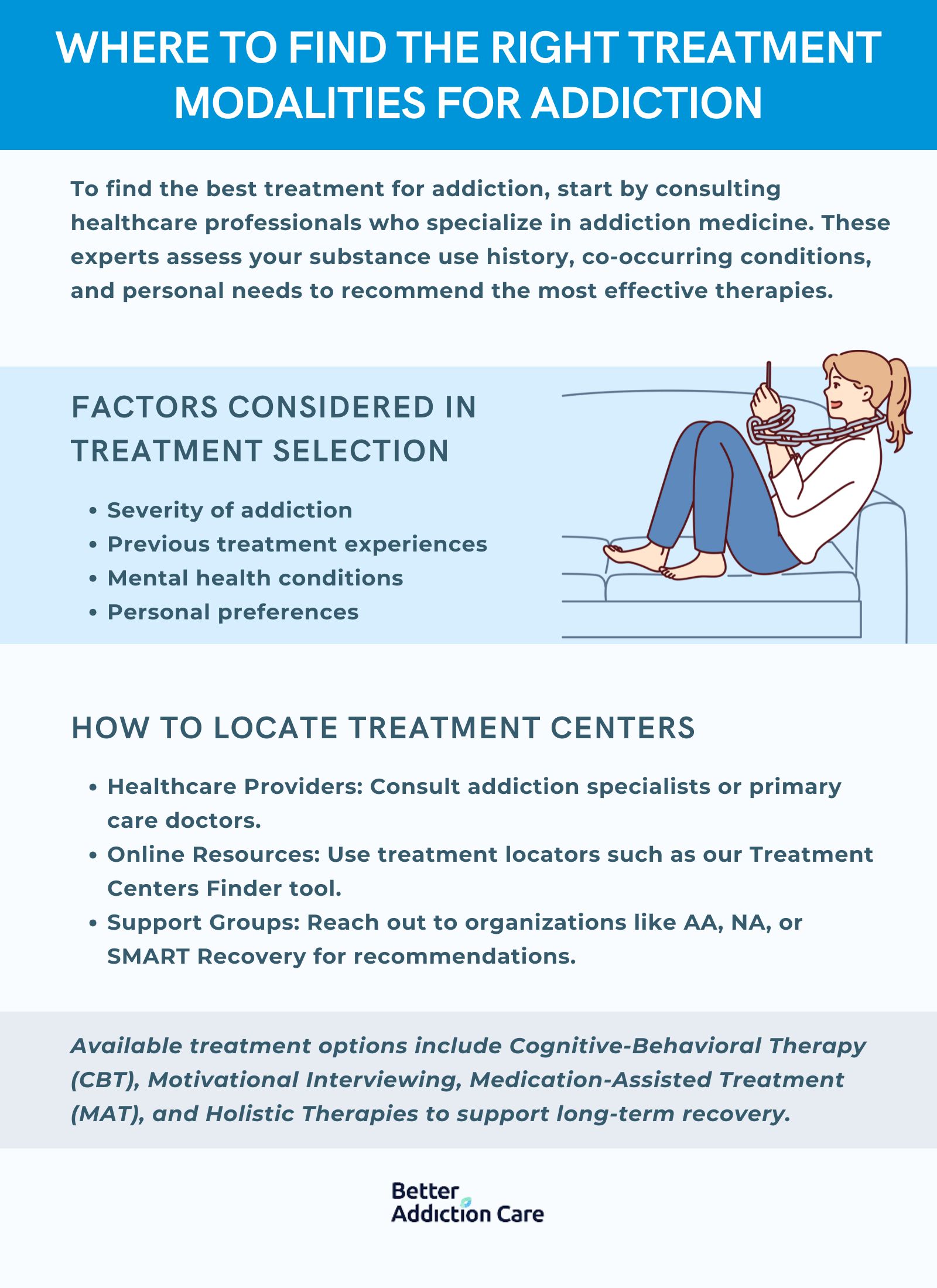
To find the right treatment modalities for addiction that suit your specific needs, begin by consulting with healthcare professionals who specialize in addiction medicine. These experts conduct comprehensive assessments to evaluate your unique circumstances, substance use history, and any co-occurring conditions that affect your recovery journey.
Treatment specialists consider multiple factors, including the severity of your addiction, previous treatment experiences, mental health needs, and personal preferences when recommending appropriate therapeutic approaches. This personalized assessment ensures you receive care that addresses both the physical and psychological aspects of addiction.
With proper guidance, you discover the combination of evidence-based therapies and support services that work most effectively for your recovery. Our Treatment Centers Finder tool helps you locate facilities offering various treatment modalities, from cognitive-behavioral therapy and motivational interviewing to holistic approaches and medication-assisted treatment.
Related Articles
Treatment Centers in Michigan
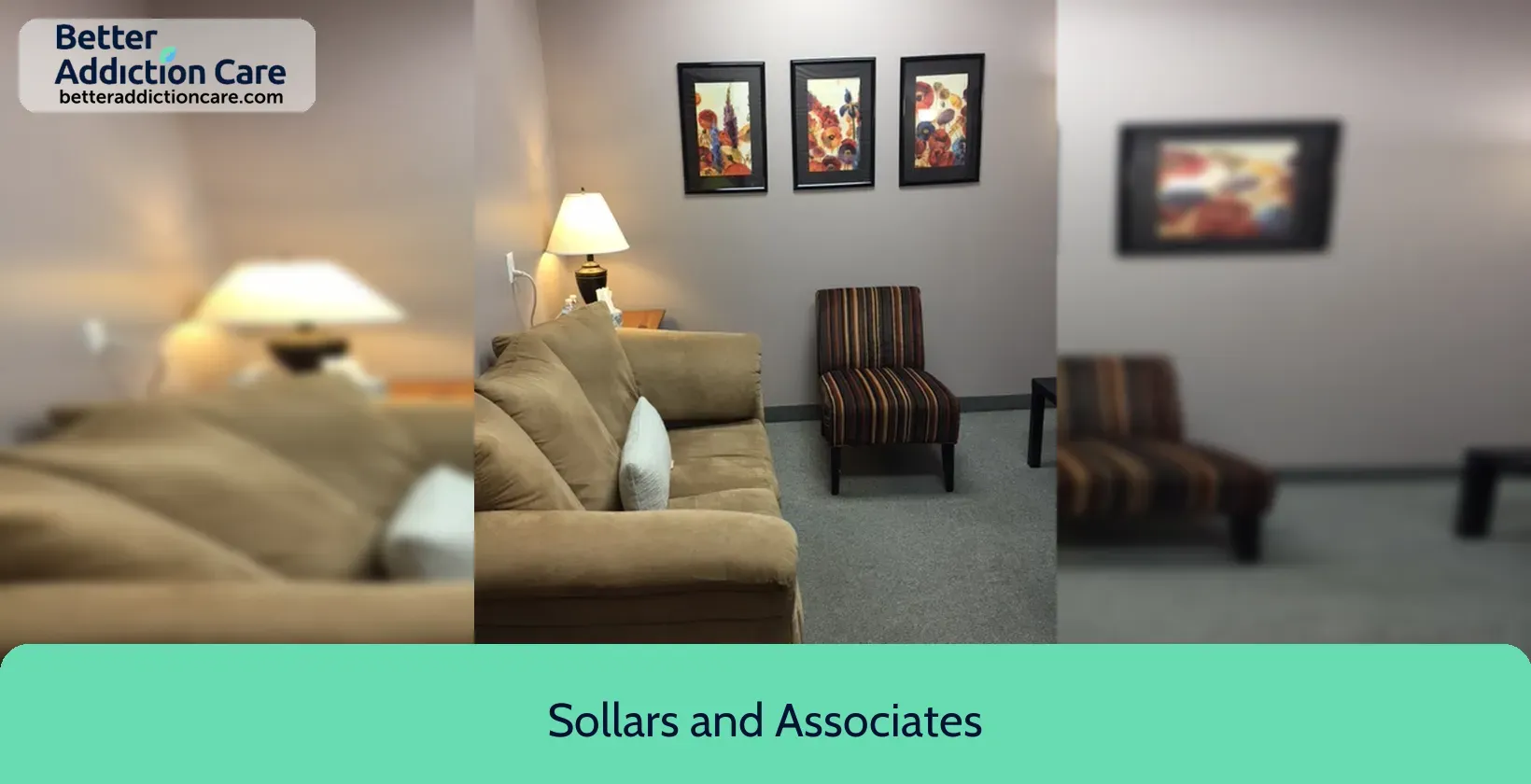 123
123
 123
123





